Programme
Keynote speaker
 |
Francesca Toni Department of Computing, Imperial College London, UK Keynote title: From Computational Argumentation to Explanation (video) Keynote abstract:In this talk I will overview recent efforts deploying computational argumentation to obtain and deliver to users explanations of different formats for a variety of systems, including recommenders, classifiers and schedulers. These efforts rely upon extracting argumentation frameworks comprising sets of arguments and dialectical relations between them (e.g. of attack and, in addition or instead, of support), enforcing semantics (defined either in terms of dialectically acceptable sets of arguments or of dialectical strength of arguments, satisfying desirable dialectical properties such as that supports against an argument should strengthen it) and deploying systems for semantics computation, thus making full use of the computational argumentation pipeline. Bio:Francesca Toni (ft@imperial.ac.uk) is Professor in Computational Logic and Deputy Head in the Department of Computing, Imperial College London, UK, and the founder and leader of the CLArg (Computational Logic and Argumentation) research group. Her research interests lie within the broad area of KR and Explainable AI, and in particular include Argumentation, Argument Mining, Logic-Based Multi-Agent Systems, Logic Programming, Non-monotonic/Default/Defeasible Reasoning. She graduated, summa cum laude, in Computing at the University of Pisa, Italy, in 1990, and received her PhD in Computing in 1995, from Imperial College London. She has coordinated two EU projects, received funding from EPSRC (in the UK) and the EU, and awarded a Senior Research Fellowship from The Royal Academy of Engineering and the Leverhulme Trust. She is currently Technical Director of the ROAD2H EPSRC-funded project (www.road2h.org/) and co-Director for the Centres of Doctoral Training in Safe and Trusted AI and in AI for Healthcare. She has published over 200 papers and co-chaired ICLP2015 (the 31st International Conference on Logic Programming) and KR 2018 (the 16th Conference on Principles of Knowledge Representation and Reasoning). She is a member of the steering committee of and KR, corner editor on Argumentation for the Journal of Logic and Computation, and in the editorial board of the Argument and Computation journal and the AI journal. |
Accepted papers
- Markus Brenneis, Maike Behrendt, Stefan Harmeling and Martin Mauve: How Much Do I Argue Like You? Towards a Metric on Weighted Argumentation Graphs pdf video
- Timotheus Kampik, Dov Gabbay: Towards DiArg: An Argumentation-based Dialogue Reasoning Engine pdf video
- Matthias Thimm and Tjitze Rienstra: Approximate Reasoning with ASPIC+ by Argument Sampling pdf video
- Wolfgang Dvořák, Anna Rapberger and Johannes P. Wallner: Labelling-based Algorithms for SETAFs pdf video
- Lars Malmqvist, Tommy Yuan, Peter Nigthingale and Suresh Manandhar: Determining the Acceptability of Abstract Arguments with Graph Convolutional Networks pdf video
- Max Rapp, Axel Adrian and Michael Kohlhase: Context Graphs for Legal Reasoning and Argumentation pdf
- Serigne Gning and Jean-Guy Mailly: On the Impact of SAT Solvers on Argumentation Solvers pdf video
- Ringo Baumann and Maximilian Heinrich: A Python Script for Abstract Dialectical Frameworks pdf video
- Jean Marie Lagniez, Emmanuel Lonca, Jean-Guy Mailly and Julien Rossit: Introducing the Fourth International Competition on Computational Models of Argumentation pdf video
The full proceedings of SAFA2020 will also be available shortly on http://ceur-ws.org.
The proceedings of SAFA2020 are available at http://ceur-ws.org/Vol-2672/.
Detailed programme
The workshop will take place virtually in Zoom. The link will be sent to all registered participants shortly before the workshop.
Schedule (CEST timezone):
| 09:15-09:30 | Welcome |
| 09:30-10:30 | Keynote: Francesca Toni - From Computational Argumentation to Explanation |
| 10:30-10:55 | Wolfgang Dvořák, Anna Rapberger and Johannes P. Wallner: Labelling-based Algorithms for SETAFs |
| 10:55-11:15 | Break |
| 11:15-11:40 | Markus Brenneis, Maike Behrendt, Stefan Harmeling and Martin Mauve: How Much Do I Argue Like You? Towards a Metric on Weighted Argumentation Graphs |
| 11:40-12:05 | Max Rapp, Axel Adrian and Michael Kohlhase: Context Graphs for Legal Reasoning and Argumentation |
| 12:05-12:30 | Lars Malmqvist, Tommy Yuan, Peter Nigthingale and Suresh Manandhar: Determining the Acceptability of Abstract Arguments with Graph Convolutional Networks |
| 12:30-12:45 | Serigne Gning and Jean-Guy Mailly: On the Impact of SAT Solvers on Argumentation Solvers |
| 12:45-13:45 | Break |
| 13:45-14:30 | Invited talk Guillermo Simari (for all COMMA workshops) |
| 14:30-14:50 | Break |
| 14:50-15:15 | Matthias Thimm and Tjitze Rienstra: Approximate Reasoning with ASPIC+ by Argument Sampling |
| 15:15-15:30 | Timotheus Kampik, Dov Gabbay: Towards DiArg: An Argumentation-based Dialogue Reasoning Engine |
| 15:30-15:45 | Ringo Baumann and Maximilian Heinrich: A Python Script for Abstract Dialectical Frameworks |
| 15:45-16:00 | Jean Marie Lagniez, Emmanuel Lonca, Jean-Guy Mailly and Julien Rossit: Introducing the Fourth International Competition on Computational Models of Argumentation |
| 16:00-16:05 | Closing |